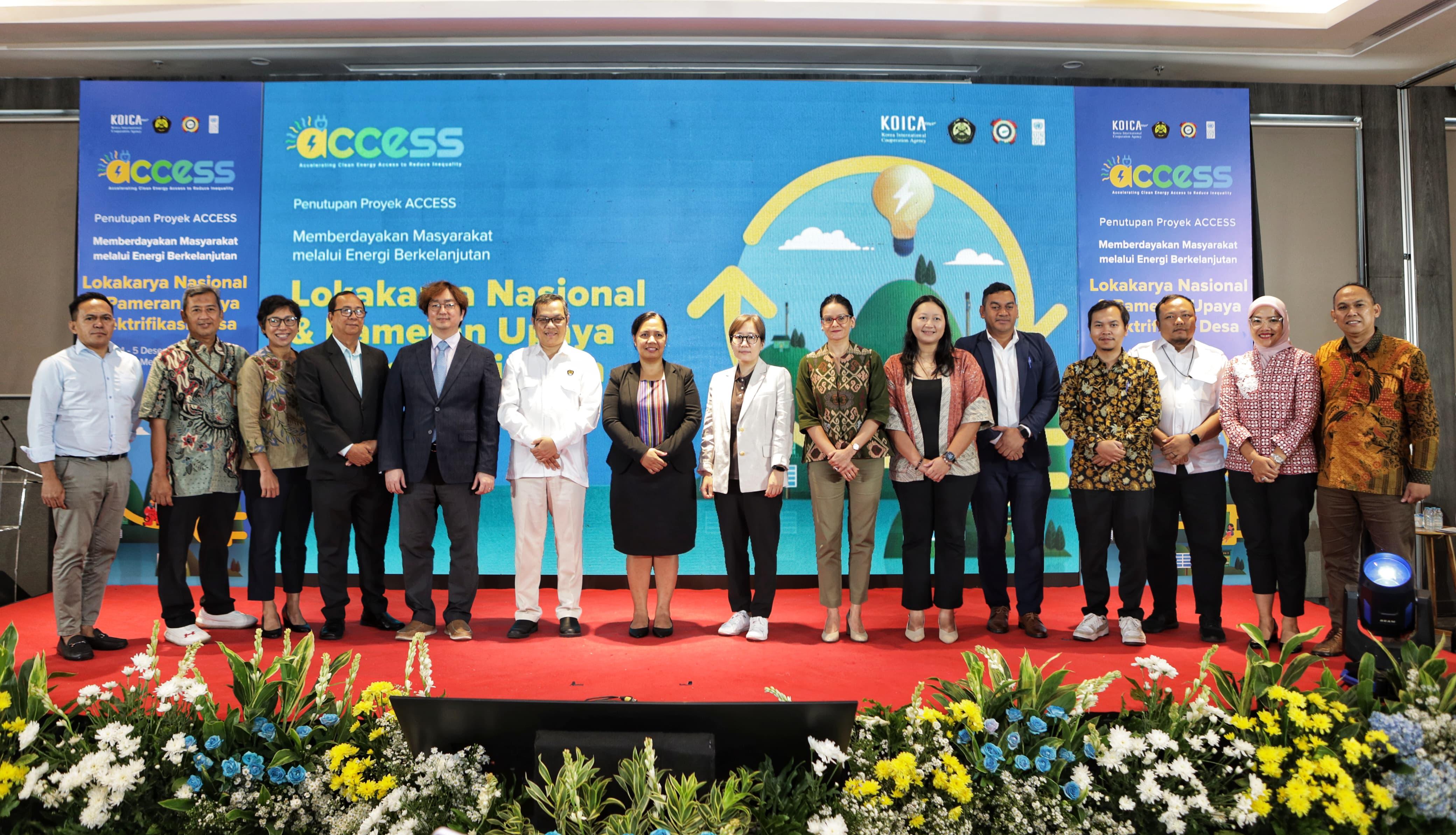Empowered Community through Sustainable Energy: ACCESS Project Closing Event
December 5, 2024

Jakarta, 4 December 2024 – The Accelerating Clean Energy Access to Reduce Inequality (ACCESS) Project has reached its remarkable conclusion, celebrating four years of transformative work in advancing renewable energy and equitable development. Implemented in 22 remote villages across Indonesia and three municipalities in Timor-Leste, the project has delivered solar power and clean water, improving lives and fostering resilience in underserved communities.
Funded by the Korea International Cooperation Agency (KOICA) and implemented by the United Nations Development Programme (UNDP), the ACCESS project addressed long-standing challenges in rural electrification and water access. The project has achieved its targets, installing solar power plants (PLTS), solar water pumps, and related infrastructure across all designated areas. With a total electricity capacity of 1.1 megawatts in Indonesia, the initiative has directly impacted 3,449 households, benefiting over 14,000 people. In Timor-Leste, solar-powered water pumps now provide clean water to approximately 700 households, improving the lives of more than 4,000 people.
During the closing ceremony of the project held in Jakarta, Sahid Junaidi, Secretary Director General of New, Renewable Energy, and Energy Conservation of Indonesia’s Ministry of Energy and Mineral Resources stated, “Aligned with the Government of Indonesia's goals to enhance energy access and resilience, the ACCESS program has supported sustainable development by expanding equitable energy access for underprivileged and remote communities. Through renewable energy solutions, the program has been a great example on effort of reducing regional disparities and fostering collaboration.”
The project is also well-aligned with the Government of Timor-Leste's vision to address critical challenges in water access and improve basic services for underserved communities.
Director General of the Ministry of State Administration of Timor Leste, Ms. Maria Goretti Marques Belo commented, “I call upon our government partners in both Indonesia and Timor-Leste to continue supporting local institutions managing renewable energy infrastructure beyond the ACCESS project in 2024. It is vital that we ensure the long-term success of these efforts, allowing communities to continue benefiting from renewable energy solutions.”

Leaving No One Behind, Legacy to Be Sustained
The project’s impact goes beyond infrastructure development, transforming lives and communities. Solar power has enabled economic activities, supported local businesses, and empowered women in remote communities. In Indonesia, 20 village-owned enterprises (BUMDesa) have launched diverse businesses leveraging the new electricity supply from clean energy. These businesses ranging from essential services and trading to agricultural related activities have achieved significant success, generating profits exceeding IDR 11 million in Lengora Pantai Village and IDR 7 million in Tasipi Village for instance. Livestock farming and agricultural enterprises are also thriving, showcasing the potential of renewable energy to drive local economic growth.
One of the ACCESS project’s key achievements is its focus on gender equality. Nearly half of the certified solar photovoltaic (PV) operators in Indonesia are women, surpassing the initial target of 30%. Women also account for 49% of officers in Renewable Energy Service Companies (UPLD) and 32% of
board members in village-owned enterprises. Women-led micro and small enterprises, supported by the project, have also used renewable energy to expand businesses such as weaving, baking, and farming.
“ACCESS has demonstrated the power of renewable energy to transform lives,” said Sujala Pant, UNDP Deputy Resident Representative in Indonesia. “With 24-hour access to electricity, children can now study under reliable lighting, healthcare facilities can operate more effectively, and local economies have been invigorated with new opportunities for growth. Women, who constitute nearly half of the beneficiaries, are emerging as catalysts for change—taking on leadership roles as certified operators and active members of local management teams. Renewable energy is not just significant on its own but it serves as a lynchpin and enabler for many other positive dividends, and acceleartor for the SDGs,” she added.

A Model of Collaboration and Sustainability
The ACCESS project has successfully fostered collaboration between Indonesia and Timor-Leste. Stakeholders have exchanged knowledge on renewable energy technologies, building capacity and establishing partnerships that will endure beyond the project’s conclusion. Alongside improving access to clean water, the project trained and certified 30 local operators in Timor-Leste, with the support from Indonesia's Ministry of Energy and Mineral Resources' Center for Human Resources Development.
As both countries work toward their national electrification and renewable energy goals, the ACCESS project stands as a model for addressing energy inequality through innovation and collaboration.
Park Soo Young, the Deputy Country Director of KOICA Indonesia highlighted the importance of sustaining these efforts, stating, "The ACCESS project has shown how collaboration and partnership can make a real difference. Through the installation of solar PV power plant in Indonesia and clean water system in Timor-Leste, the initiative has provided essential services for thousands of households and small enterprises. More than just providing access to energy and water, the project also built capacity for local communities with skill and knowledge to further develop and sustain in the future.”
About UNDP
UNDP is the leading United Nations organization in fighting to end the injustice of poverty, inequality, and climate change. Working with partners in 170 countries, UNDP helps nations to build integrated, sustainable solutions for people and the planet. Learn more at www.undp.org/Indonesia or follow at @undpindonesia.
Media Contacts
Nabilla Rahmani
Head of Communication, UNDP Indonesia
Nabilla.rahmani@undp.org

 Locations
Locations



